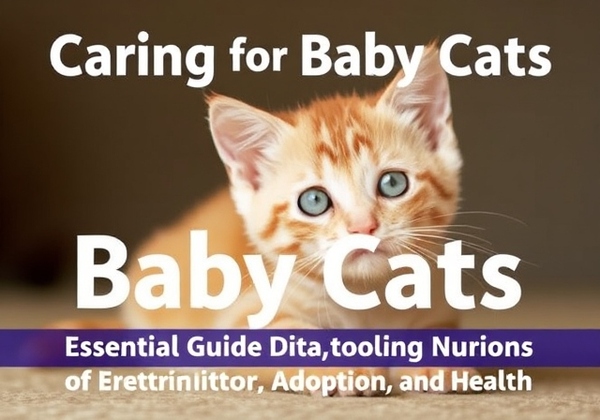Baby cats, or kittens, are adorable and playful companions. With their tiny paws, soft fur, and boundless energy, they bring joy to any home. Whether you’re planning to adopt a kitten or already have one, understanding their specific needs is key to providing the best care. This guide covers everything about baby cats, from diet and health to socialization and where to find them.
What Are Baby Cats?
Baby Cats Kittens are the young offspring of domestic cats, typically born after a gestation period of 63–65 days. Litters often range from two to five kittens. At birth, kittens are vulnerable and rely entirely on their mother for warmth, nutrition, and protection. As they grow, they become more independent and develop unique personalities.
Life Stages of Kittens
Kittens grow quickly, passing through several important developmental stages:
- Neonatal Stage (0 to 2 Weeks): At this stage, kittens are blind and deaf, depending on their mother for milk and warmth.
- Transitional Stage (2 to 4 Weeks): Kittens begin to open their eyes and ears, explore their surroundings, and interact with littermates.
- Socialization Stage (4 to 9 Weeks): Social skills develop as kittens engage with humans, other animals, and new environments. They also start eating solid food.
- Juvenile Stage (9 Weeks and Older): Kittens are fully weaned, eating solid food, and ready for adoption around eight weeks of age.
Why Socialization Is Essential
Early socialization helps kittens grow into confident, friendly adult cats. Exposing them to various sounds, people, and other animals during this period lays the foundation for well-adjusted behavior. Adopting from a shelter or a responsible breeder who values early socialization can make a significant difference in a kitten’s life.
Nutrition for Baby Cats: What They Eat
Feeding kittens properly is essential for their health. Here’s a breakdown of dietary needs for each stage:
1. Nursing Stage (0 to 4 Weeks)
In the early weeks, kittens depend entirely on their mother’s milk. If the mother isn’t available, a high-quality kitten milk replacer is necessary.
2. Transition to Solid Food (4 to 8 Weeks)
Around four weeks, kittens begin transitioning to solid food. Offer them:
- Wet Kitten Food: Nutritious and easy to digest, canned food is ideal at this stage.
- Dry Kitten Food: Introduce dry food gradually once they’re accustomed to wet food. Choose options specifically made for kittens.
3. Fully Weaned (8 Weeks and Older)
By eight weeks, kittens are ready for solid food alone. Providing a balanced, high-quality kitten formula ensures they get the nutrients needed for growth.
Safe Foods for Baby Cats
Here are safe food options for kittens:
- Kitten Formula: Use as a supplement if needed.
- Wet Food: Select options designed for kittens.
- Dry Food: Make sure it’s specifically for kittens to support growth.
- Occasional Treats: Small pieces of cooked chicken or fish make healthy treats—avoid seasoning or processed foods.
Caring for Baby Cats
Proper care goes beyond nutrition. Here are some essential tips for new kitten owners:
Creating a Safe Environment
- Cozy Bed: Provide a soft, quiet area where your kitten can feel secure.
- Litter Box Training: Begin training right away with a low-sided box and non-clumping litter.
- Toys and Stimulation: Kittens need mental and physical stimulation. Offer various toys like feather wands, crinkle balls, and interactive puzzles to keep them engaged.
Regular Veterinary Care
Taking your kitten for regular vet checkups and vaccinations is essential for their health. The vet can guide you on vaccinations, nutrition, and general care.
Understanding Kitten Behavior
Kittens are naturally curious, active, and playful. Understanding their behavior allows you to provide a nurturing environment:
- Playtime: Essential for physical and mental development. Interactive play helps kittens learn coordination and social skills.
- Scratching and Climbing: Provide scratching posts and climbing trees to fulfill these natural behaviors and protect your furniture.
Spaying and Neutering
Consider spaying or neutering your kitten around five to six months of age. This helps control the pet population and can prevent certain health issues and unwanted behaviors.
Health Concerns in Kittens
Be aware of common health issues to keep your kitten safe and healthy:
- Upper Respiratory Infections: Often seen in young kittens, especially in shelters. Look out for sneezing and coughing.
- Worms: Regular vet checkups help monitor and treat worms, which kittens can acquire from their mothers or the environment.
- Fleas and Ticks: Ensure your kitten is protected from parasites with safe treatments.
Recognizing Illness
Watch for signs of illness in your kitten, including:
- Loss of Appetite: If your kitten isn’t eating, it’s a sign to consult your vet.
- Lethargy: A sudden decrease in energy can indicate health problems.
- Vomiting or Diarrhea: These symptoms may signal dietary issues or infections—contact your vet if they persist.
Baby Cats for Adoption or Sale
If you’re interested in adopting a kitten, shelters and rescue organizations often have many available. Adopting is a rewarding experience, offering a loving home to a pet in need. Alternatively, if looking for kittens for sale, research reputable breeders who prioritize health and well-being.
Conclusion
In conclusion, kittens bring immense joy to our lives with their playful, affectionate personalities. Understanding their dietary needs, behavior, and how to care for them is essential for any pet owner. Whether you adopt or buy, creating a safe and loving environment will allow your kitten to grow into a healthy, happy cat that shares many years of companionship with you.
Pawo Mania The Best Guide For your Pets.



